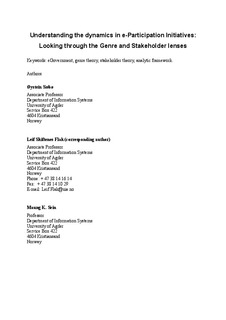| dc.contributor.author | Sæbø, Øystein | |
| dc.contributor.author | Flak, Leif Skiftenes | |
| dc.contributor.author | Sein, Maung K. | |
| dc.date.accessioned | 2011-12-13T10:24:09Z | |
| dc.date.available | 2011-12-13T10:24:09Z | |
| dc.date.issued | 2011 | |
| dc.identifier.citation | Sæbø, Ø., Flak, L. S., & Sein, M. K. (2011). Understanding the dynamics in e-Participation initiatives: Looking through the genre and stakeholder lenses. Government Information Quarterly, 28, 416-425. doi: 10.1016/j.giq.2010.10.005 | no_NO |
| dc.identifier.issn | 0740-624X | |
| dc.identifier.uri | http://hdl.handle.net/11250/136252 | |
| dc.description | Accepted version of an article published in the journal: Government Information Quarterly. Also available from the publisher at: http//dx.doi.org/10.1016/j.giq.2010.10.005 | no_NO |
| dc.description.abstract | Conventionally, e-Participation initiatives are considered to be successful only if users use these services. While the growing body of e-Participation literature has listed and studied challenges and barriers to achieving this end, conceptual clarity on why such projects are considered as failures is yet to be achieved. We argue that this is due to the inadequate understanding of the complex stakeholder dynamics of an e-Participation project. In this paper, we seek to address this knowledge gap by proposing that using Stakeholder theory complemented by Genre theory provides an interpretive lens to understand the complexities in the development and use of e-Participation projects. To illustrate our proposed lens, we apply it to analyze an e-Participation project in Norway at its development and use phases. Our findings indicate that a key factor that influences success of e-Participation initiatives is high saliency of at least one stakeholder group at various phases of the initiatives. The saliency of stakeholders changes over the life of a project and hence the salient stakeholder also varies. Consequently, it is not essential for the same stakeholder group to be salient throughout, only that some stakeholder remains salient. Our interpretive lens also extends the discourse on Stakeholder Theory where in traditional Management literature, it is meant as a tool to identify stakeholders groups to which management or owner of an organization should pay attention. We show that it is also useful to identify which stakeholder groups will act to protect their interests. Based on our findings, we propose insights into studying and developing e-Participation projects. | no_NO |
| dc.language.iso | eng | no_NO |
| dc.publisher | Elsevier | no_NO |
| dc.subject | eGovernment, genre theory, stakeholder theory, analytic framework | no_NO |
| dc.title | Understanding the dynamics in e-Participation initiatives: Looking through the genre and stakeholder lenses | no_NO |
| dc.type | Journal article | no_NO |
| dc.type | Peer reviewed | no_NO |
| dc.subject.nsi | VDP::Social science: 200::Library and information science: 320::Information and communication systems: 321 | no_NO |
| dc.source.pagenumber | 416-425 | no_NO |
| dc.source.volume | 28 | no_NO |
| dc.source.journal | Government Information Quarterly | no_NO |
